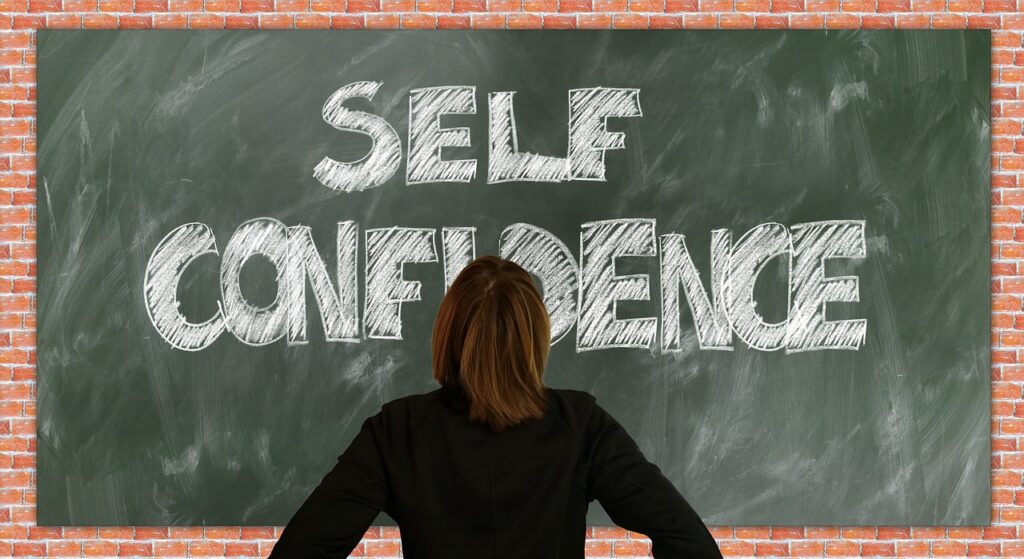In a world where self-doubt and insecurity can often overshadow our potential, building self-confidence is more crucial than ever. Whether you’re navigating a career change, striving for personal growth, or simply seeking to enhance your self-esteem, this comprehensive guide will walk you through proven strategies to develop lasting self-confidence.

Understanding Self-Confidence
Before diving into techniques for building self-confidence, it’s essential to understand what self-confidence truly means. At its core, self-confidence is the belief in your own abilities, qualities, and judgment. It’s the assurance that you can face challenges and succeed, regardless of obstacles.
Self-confidence is not about being arrogant or overestimating your abilities; instead, it’s about having a realistic and positive view of yourself. It involves knowing your strengths, acknowledging your weaknesses, and still feeling capable of handling life’s ups and downs.
The Importance of Self-Confidence
Self-confidence impacts almost every aspect of your life. It influences your:
- Career: Confident individuals are more likely to take on new challenges, advocate for themselves, and pursue career advancement opportunities.
- Relationships: Self-confidence improves interpersonal relationships by fostering better communication and reducing insecurities that can lead to conflict.
- Mental Health: A strong sense of self-worth is linked to lower levels of anxiety and depression.
- Personal Growth: Confidence encourages you to step out of your comfort zone and pursue personal goals and ambitions.
Strategies for Building Self-Confidence
Building self-confidence is a gradual process that involves both internal and external changes. Here are some effective strategies to enhance your self-confidence:
1. Identify and Acknowledge Your Strengths
Start by making a list of your strengths and achievements. Reflect on times when you overcame challenges or succeeded in your endeavors. Acknowledging these positive aspects helps build a solid foundation for self-confidence.
Action Step: Create a “success journal” where you record your accomplishments, skills, and positive feedback from others. Regularly reviewing this journal will reinforce your self-belief.
2. Set Realistic Goals
Establishing and accomplishing goals is an effective method for boosting self-confidence. Divide larger objectives into smaller, achievable tasks and take the time to celebrate each milestone you reach.
Action Step: Apply the SMART framework (Specific, Measurable, Achievable, Relevant, Time-bound) to define your goals. For instance, rather than stating a general goal like “become fit,” specify it as “work out for 30 minutes three times each week for the next two months.”
3. Challenge Negative Self-Talk
Negative self-talk can erode your self-confidence. Challenge these negative thoughts by questioning their validity and replacing them with positive affirmations.
Action Step: Identify common negative thoughts you have about yourself and counter them with positive affirmations. For instance, if you think “I’m not good enough,” replace it with “I am capable and deserving of success.”
4. Develop New Skills
Learning and mastering new skills can significantly boost your confidence. Whether it’s acquiring a new hobby, taking a course, or developing a professional skill, the process of learning and improvement enhances self-esteem.
Action Step: Choose a skill you’re interested in and commit to learning it. Set aside time each week for practice and track your progress.
5. Surround Yourself with Positive Influences
The company you keep can influence your self-confidence. Choose to be around supportive and positive people who inspire and motivate you.
Action Step: Assess your social network and cultivate connections that promote positivity and personal development. Reduce the time you spend with those who introduce negativity into your life.
6. Practice Self-Care
Prioritizing your physical, emotional, and mental health is essential for enhancing self-confidence. Self-care practices may involve consistent exercise, nutritious eating habits, adequate sleep, and relaxation methods.
Action Step: Create a self-care routine that includes activities you love and that boost your self-esteem. This might involve exercising, practicing meditation, or dedicating time to your hobbies.
7. Embrace Failures and Learn from Them
Failure is a natural part of life and a valuable learning experience. Instead of letting failures diminish your confidence, view them as opportunities for growth and improvement.
Action Step: When faced with a setback, analyze what went wrong and what you can learn from the experience. Adjust your approach and move forward with newfound knowledge and resilience.
8. Visualize Success
Visualization is a powerful technique used by successful individuals across various fields. By picturing yourself achieving your goals and experiencing success, you create a mental blueprint that can boost your confidence.
Action Step: Spend a few minutes each day visualizing yourself successfully completing a task or achieving a goal. Imagine the feelings of accomplishment and success that accompany it.
9. Improve Body Language
Your body language can affect how you feel about yourself and how others perceive you. Adopting confident body language can enhance your self-esteem and influence others’ perceptions positively.
Action Step: Practice maintaining good posture, making eye contact, and using open gestures. These simple changes can make you appear and feel more confident.
10. Seek Feedback and Learn from It
Constructive feedback from others can provide valuable insights into your strengths and areas for improvement. Use feedback as a tool for growth rather than a source of self-doubt.
Action Step: Ask for feedback from trusted colleagues, friends, or mentors and use it to make positive changes. Approach feedback with an open mind and a willingness to learn.

Maintaining Self-Confidence Over Time
Building self-confidence is not a one-time effort but a continuous process. To maintain and further enhance your confidence, consider the following practices:
- Regular Self-Reflection: Periodically review your progress and adjust your goals and strategies as needed.
- Celebrate Achievements: Take time to acknowledge and celebrate your successes, no matter how small.
- Stay Adaptable: Embrace change and remain open to new experiences that challenge and grow your confidence.
- Seek Professional Help: If self-doubt or confidence issues persist, consider seeking guidance from a therapist or counselor who can provide support and strategies for overcoming these challenges.
Conclusion
Building self-confidence is a transformative journey that requires commitment, self-awareness, and perseverance. By implementing the strategies outlined in this guide, you can develop a robust sense of self-confidence that empowers you to face challenges, pursue your goals, and lead a fulfilling life. Remember, confidence is not a destination but a continuous journey of self-discovery and growth. Embrace the process, and watch as your self-confidence flourishes, paving the way for a more empowered and successful you.







